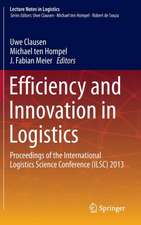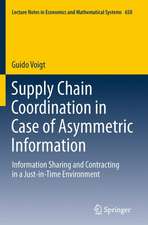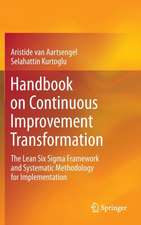Quantifying the Value of RFID and the EPCglobal Architecture Framework in Logistics
Autor Dieter Uckelmannen Limba Engleză Paperback – 9 mai 2014
research concerning cost and benefit estimations is provided and the limits of Cost Benefit Sharing for RFID-based IT-infrastructures are explained. In this work a market driven evaluation based on sales potential of information is developed. Simple technical means for aggregation of micro values to a billable amount are discussed. The requirements for electronic billing infrastructure are defined and a matching e-billing solutions for an evaluation scenario is presented, providing a technical infrastructure to evaluate and bill product-related information in a future Internet of Things, based on an extended EPCglobal Architecture. Further opportunities and threats are discussed to provide an overview of its future potential. As a result it will contribute to the sustainable success of the Internet of Things itself.
| Toate formatele și edițiile | Preț | Express |
|---|---|---|
| Paperback (1) | 634.18 lei 43-57 zile | |
| Springer Berlin, Heidelberg – 9 mai 2014 | 634.18 lei 43-57 zile | |
| Hardback (1) | 639.25 lei 43-57 zile | |
| Springer Berlin, Heidelberg – 26 apr 2012 | 639.25 lei 43-57 zile |
Preț: 634.18 lei
Preț vechi: 746.09 lei
-15% Nou
Puncte Express: 951
Preț estimativ în valută:
121.39€ • 131.90$ • 102.03£
121.39€ • 131.90$ • 102.03£
Carte tipărită la comandă
Livrare economică 21 aprilie-05 mai
Preluare comenzi: 021 569.72.76
Specificații
ISBN-13: 9783642436970
ISBN-10: 3642436978
Pagini: 168
Ilustrații: XXIV, 144 p.
Dimensiuni: 155 x 235 x 9 mm
Greutate: 0.25 kg
Ediția:2012
Editura: Springer Berlin, Heidelberg
Colecția Springer
Locul publicării:Berlin, Heidelberg, Germany
ISBN-10: 3642436978
Pagini: 168
Ilustrații: XXIV, 144 p.
Dimensiuni: 155 x 235 x 9 mm
Greutate: 0.25 kg
Ediția:2012
Editura: Springer Berlin, Heidelberg
Colecția Springer
Locul publicării:Berlin, Heidelberg, Germany
Public țintă
ResearchCuprins
Limiting obstacles to success of RFID and the EPCglobal Network in logistics.- Electronic information sharing in supply networks.- Performance measurement and cost benefit analysis for RFID and Internet of Things implementations in logistics.- Preconditions for creating economic value through market-driven information pricing and billing in B2B scenarios.- Modelling and prototyping an integration of billing mechanisms into the EPCglobal Network Architecture.- Evaluation of the technical billing-enabled Internet of Things framework.
Recenzii
From the reviews:
“In this book version of his dissertation, Uckelmann painstakingly details the limitations and obstacles to success for two key emerging technologies: radio frequency identification (RFID) and the EPCglobal architecture framework. … Uckelmann demonstrates that the traditional types of cost benefit analyses for these kinds of technology adoption projects are flawed, in that they do not convince managers to adopt them. … Readers of this book will gain an understanding of how to properly define and evaluate information flows in a supply network.” (Ernest Hughes, ACM Computing Reviews, July, 2012)
“In this book version of his dissertation, Uckelmann painstakingly details the limitations and obstacles to success for two key emerging technologies: radio frequency identification (RFID) and the EPCglobal architecture framework. … Uckelmann demonstrates that the traditional types of cost benefit analyses for these kinds of technology adoption projects are flawed, in that they do not convince managers to adopt them. … Readers of this book will gain an understanding of how to properly define and evaluate information flows in a supply network.” (Ernest Hughes, ACM Computing Reviews, July, 2012)
Notă biografică
Dieter Uckelmann is managing director of the LogDynamics Lab at the University of Bremen. His main research area include the synchronization of material, information, and financial flows under the influence of Auto-ID and billing technologies. Dieter Uckelmann is co-founder and president of the Global RF Lab Alliance – an international network of RFID-focused research organizations with representatives in Europe, USA and Asia and associate editor of the International Journal of RF Technologies: Research and Applications.
Textul de pe ultima copertă
The “EPCglobal Architecture Framework” is currently the most accepted technical approach to the Internet of Things and provides a solid foundation for building Business-to-Business information networks based on unique identifications of ‘things’. Lately, the vision of the Internet of Things has been extended to a more holistic approach that integrates sensors as well as actuators and includes non-business stakeholders. A detailed look at the current state of the art in
research concerning cost and benefit estimations is provided and the limits of Cost Benefit Sharing for RFID-based IT-infrastructures are explained. In this work a market driven evaluation based on sales potential of information is developed. Simple technical means for aggregation of micro values to a billable amount are discussed. The requirements for electronic billing infrastructure are defined and a matching e-billing solutions for an evaluation scenario is presented, providing a technical infrastructure to evaluate and bill product-related information in a future Internet of Things, based on an extended EPCglobal Architecture. Further opportunities and threats are discussed to provide an overview of its future potential. As a result it will contribute to the sustainable success of the Internet of Things itself.
research concerning cost and benefit estimations is provided and the limits of Cost Benefit Sharing for RFID-based IT-infrastructures are explained. In this work a market driven evaluation based on sales potential of information is developed. Simple technical means for aggregation of micro values to a billable amount are discussed. The requirements for electronic billing infrastructure are defined and a matching e-billing solutions for an evaluation scenario is presented, providing a technical infrastructure to evaluate and bill product-related information in a future Internet of Things, based on an extended EPCglobal Architecture. Further opportunities and threats are discussed to provide an overview of its future potential. As a result it will contribute to the sustainable success of the Internet of Things itself.
Caracteristici
The developed integrated billing solution offers a new dimension to generating revenues from any information access through the Internet of Things New business models are enabled Includes supplementary material: sn.pub/extras












